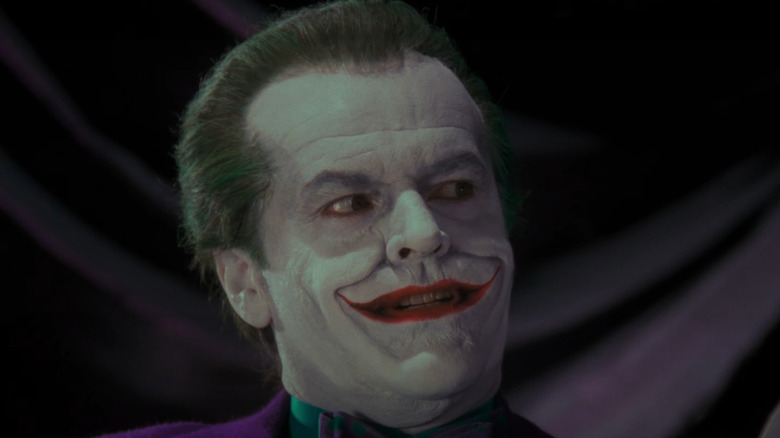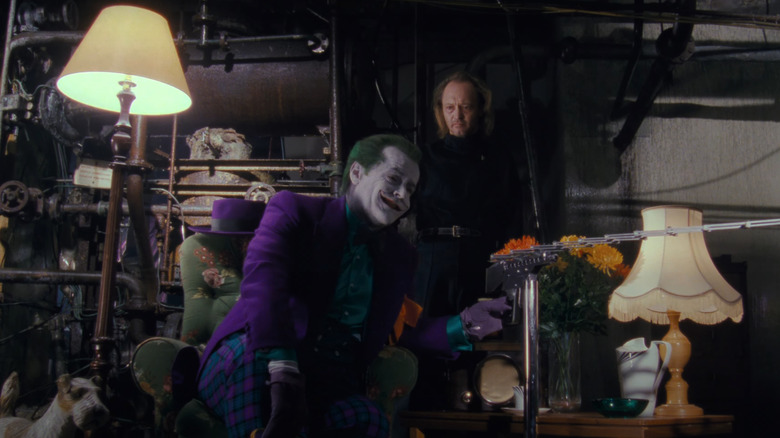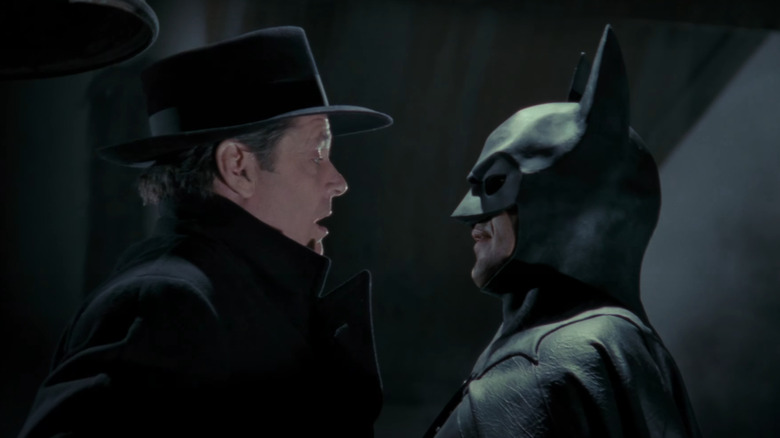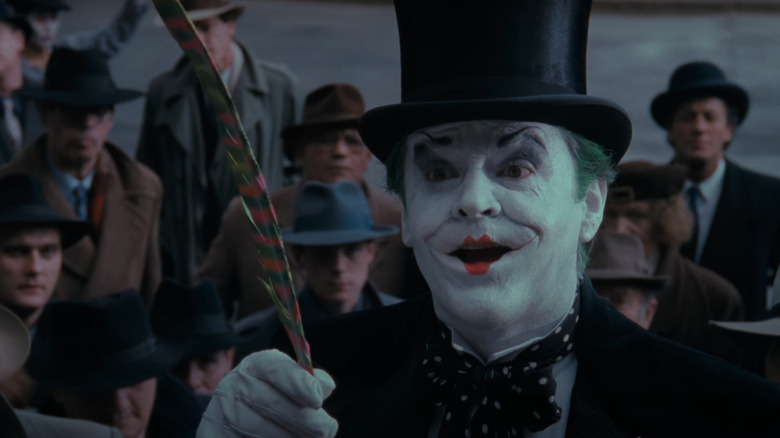Jack Nicholson Wanted His Version Of The Joker To Be Something That Left Kids Scared
Tim Burton thinks his 1989 "Batman" is a "lighthearted romp," and I get it. Compared to Matt Reeves' "The Batman," Burton's characters are a little more outlandish, the sets a little more fantastical, and the plot less grounded. But none of that makes his seminal superhero effort lighthearted. In fact, growing up in small-town England, I would endlessly rewatch "Batman" and its sequel, 1992's "Batman Returns," precisely because their darkness was so intriguing.
I'm not sure why my parents let me watch them, because there's enough violence, sexuality, and general grotesquery in both to well and truly earn the first movie its "12" rating, and the second its "15" rating. I use the British Board of Film Classification ratings because I have vivid memories of walking into the video rental store as a youngster, seeing those little colored circles on the "Batman" and "Batman Returns" cases, and knowing damn well I had no business watching them. But watch them, I did. Those movies endlessly played on our tube TV with a resolution so low it actually made them look even darker, weirder, and grainier than Burton had intended.
And despite the director's view, "dark, weird, and grainy" is how I'd describe them. These films weren't Richard Donner's "Superman," which I also loved. No, these were windows into a peculiar nether world that was so transporting I often feel like I spent more time growing up in Burton's Gotham than I did in my little hometown. And what gave the films their edge over literally anything else was the darkness. Witnessing Jack Nicholson's Joker scorch a man to near ashes using a deadly hand buzzer in "Batman" scared the hell out of me. And I loved it. Which, as it happens, is exactly how Nicholson had planned it all along.
Burton's unique vision for Batman
When "Batman" debuted in '89, the world went crazy for Burton's gloomy vision of the character. The director, who's since made a whole career out of dramatizing his unique outsider perspective, brought that perspective to the Dark Knight and ran with it. Whether it was hiring Hammer horror legend Michael Gough to play Alfred, creating a Gotham that looked like, "hell erupted through the pavement and kept on going," or depicting the title character as a laconic, shadowy weirdo, Burton was clearly determined to bring his uniquely dark sensibilities to 1989's "Batman." And it all paid off, reaffirming the character as a mysterious figure of the night after decades of Batman trying to shake off the silliness of the 1960s Adam West TV show.
Luckily, everyone else involved in the project seemed to lock into Burton's vision. Michael Keaton — a controversial choice for the lead role and yet still the best Batman — delivered a suitably reserved and brooding take on Bruce Wayne/Batman, while even supporting characters, such as Jack Palance's Carl Grissom or William Hootkins' Lieutenant Max Eckhardt, lent the film an imposing noirish grittiness that blended seamlessly with Burton's ominous aesthetic. But by far the guy who got the whole vision most seems to have been Jack Nicholson — The Joker himself.
'The more you scare them, the more they like it'
The Hollywood vet had negotiated a, frankly, insane deal to star in "Batman," gaining an escalating percentage of gross profits and top billing ahead of Keaton in return for lending the film some serious gravitas by playing The Joker. But it was worth it. The star recalled how he too was committed to a darker take on the Batman universe in a featurette, surfaced by The Hollywood Reporter:
"I was afraid because of my feel of the television series and the way movies tend to be done and talked about. I didn't want this to go through the normal, 'Let's brighten it up for the kids,' [...] I thought this was a very strong — in every way — transitional movie about the genre."
Transitional it was. "Batman" built on the darker tone established by comics of the 1980s — most famously Frank Miller's "The Dark Knight Returns" — to help bring the character back to his roots as a "Weird figure of the dark," to quote "Detective Comics" #33 from 1939. It would take Bruce Timm and Eric Radomski to help cement that rediscovered darkness with "Batman: The Animated Series." But Burton had arguably done most of the heavy lifting with "Batman" and "Batman Returns." Both movies reveled in their dark aesthetic, and for his part, Nicholson keyed in on how important that aspect was. The actor had actually started his career starring in low-budget horror movies, saying:
"My early experience in working for an audience full of children: the more you scare them, the more they like it. The worse you are, the better, because that was my response to the Joker. This is a hateful occurrence, this man, if you looked at it literally. Every kid loves this guy, I believe."
The Joker was emblematic of Tim Burton's Batman
Nicholson, at least in my case, was absolutely right. With his Joker, he encapsulated what was so beguiling about Burton's bleak Batman vision. This was a movie that kids would obviously want to see, but probably shouldn't. For me, watching The Joker murder people in devilishly ingenious ways was as thrilling as it was terrifying. Seeing him converse with the smoking corpse of a mob boss before announcing sardonically, "I'm glad you're dead," got my adrenaline going more than any Superman movie ever could, no matter how incontrovertibly upstanding its central character.
This was something different — the kind of thing that leaves indelible images on your mind. And not in the "I'm scarred for life" way that some horror movies do (I'm looking at you "Speak No Evil"). No, for me and I'm sure so many other kids, this was our first exposure to darker ideas. Despite the dour subject matter, It felt oddly uplifting in the sense that it was expanding our perspective on the world. Just as the actor said, the more we were scared, the more we wanted more because it felt like discovering new parts of our own minds. It was frightening and intriguing in the way any new experience worth having can be.
In retrospect, "Batman" seems like such an unlikely confluence of ideas and sensibilities. Everyone, Nicholson included, was united with the director in the pursuit of a singular vision. And while I've since grown to particularly love Nicholson as the talented and intelligent actor he is, his Joker will always be my favorite role. For that, I think I can speak for many a nostalgic 30-something-year-old when I say, thanks for scaring the s*** out of us as kids, Jack.



